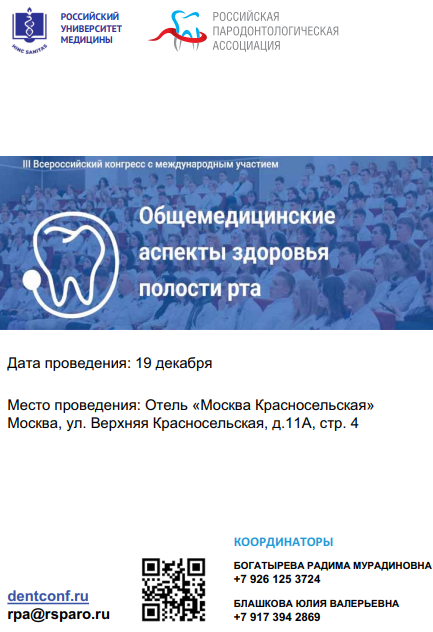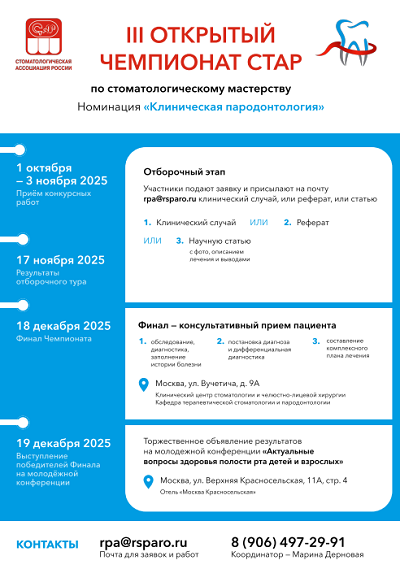An experimental model of maxillary sinus ballooning in rabbits following surgically induced trauma
https://doi.org/10.33925/1683-3031-2025-885
Abstract
Relevance. This study explores the characteristics of maxillary sinus ballooning in rabbits following surgically induced trauma.
Materials and methods. The experimental setup included a physiodispenser, turbine handpiece, disc burs, bellied scalpel, hemostatic clamp, anatomical forceps, biodegradable suture, balloon tampon, and the LAKK-M laser Doppler flowmetry system.
Results. inducing surgical trauma to the anterior wall of the maxillary sinus and inserting a balloon catheter into the sinus via the nasal passage. The feasibility of investigating microcirculation in the maxillary sinus was assessed. Macro- and microscopic examinations were performed on the maxillary sinus tissue complex of three rabbits (mean body weight: 3200 ± 600 g) at the sites of balloon contact with the surgically injured area.
Conclusion. The findings confirm that rabbits with a mean body weight of 3200 ± 600 g are a suitable model for studying the effects of maxillary sinus ballooning following surgical trauma. These results are of relevance to both maxillofacial surgery and otorhinolaryngology.
About the Authors
E. K. AkhinyanRussian Federation
Eduard K. Akhinyan, DDS, Assistant Professor, Department of the Maxillofacial Surgery and Dentistry
Moscow
S. A. Epifanov
Russian Federation
Sergey A. Epifanov, DDS, PhD, DSc, Professor, Head of the Department of Maxillofacial Surgery and Dentistry
70 Nizhnyaya Pervomaiskaya Str., Moscow, 105203
O. Z. Topolnitsky
Russian Federation
Orest Z. Topolnitsky, DDS, PhD, DSc, Professor, Honored Doctor of the Russian Federation Head of the Pediatric Maxillofacial Surgery
Moscow
K. G. Apostolidi
Russian Federation
Konstantin G. Apostolidi, MD, PhD, DSc, Docent, Head of the Department of Otorhinolaryngology
Moscow
Yu. D. Mironyuk
Russian Federation
Yulia D. Mironyuk, MD, laboratory assistant, Department of the Maxillofacial Surgery and Dentistry
Moscow
References
1. Karpov OE, Epifanov SA, Balin VN., Apostolidi KG. Surgical treatment of patients with injury of nazoorbithoetmoidal complex in the hybrid operating. Bulletin of Pirogov National Medical & Surgical Center. 2014; 9(2):48-52(In Russ). Available from: https://www.elibrary.ru/item.asp?id=272854182
2. Piskunov SZ, Piskunov IS, Mezentseva OJu, Abramenko MA, Levchenko AS, Ponomareva MN. Anatomical and morphological characteristics of the rabbit nose and paranasal sinuses. Russian rhinology. 2015;23(3):36‑41 (In Russ.). Available from: https://elibrary.ru/item.asp?id=25440093
3. Shustova VM. Anatomy of the skeleton of the rabbit head. Theoretical and applied bases of veterinary science. 2024:384-386 (In Russ.). Available from: https://elibrary.ru/item.asp?id=67919492&selid=679196254
4. McGoldrick P, Joyce PI, Fisher EM, Greensmith L. Rodent models of amyotrophic lateral sclerosis. Biochim Biophys Acta. 2013;1832(9):1421-1436. doi: 10.1016/j.bbadis.2013.03.012
5. Mapara M, Thomas BS, Bhat KM. Rabbit as an animal model for experimental research. Dent Res J (Isfahan). 2012;9(1):111-118. doi: 10.4103/1735-3327.92960
6. Schanaider A, Silva PC. Use of animals in experimental surgery. Acta Cir Bras. 2004;19(4):441-447. doi: 10.1590/S0102-86502004000400014
7. Makarova MN, Makarov VG. Rabbits in preclinical research. Laboratory Animals for Science. 2023; 6(3):18– 43 (In Russ.). doi: 10.57034/2618723X-2023-03-02.
8. Rybakova AV, Makarova MN, Makarov VG.. Using rabbits in pre-clinical trials. Mezhdunarodnyj vestnik veterinarii. 2016;(4):113-117 (In Russ.). Available from: https://elibrary.ru/item.asp?id=27594552
9. Bosze ZS, Houdebine LM.Application of rabbits in biomedical research: a review. World Rabbit Sci. 2006;14(1):1-14. doi:10.4995/wrs.2006.712
10. Pekow CA Basic Experimental Methods in the Rabbit. In: Suckow MA, Stevens KA, Wilson RP, editors. he Laboratory Rabbit, Guinea Pig, Hamster, and Other Rodents. London: Academic Press; 2012:243-258. doi: 10.1016/B978-0-12-380920-9.00010-9
Review
For citations:
Akhinyan E.K., Epifanov S.A., Topolnitsky O.Z., Apostolidi K.G., Mironyuk Yu.D. An experimental model of maxillary sinus ballooning in rabbits following surgically induced trauma. Pediatric dentistry and dental prophylaxis. 2025;25(2):130-136. (In Russ.) https://doi.org/10.33925/1683-3031-2025-885





































